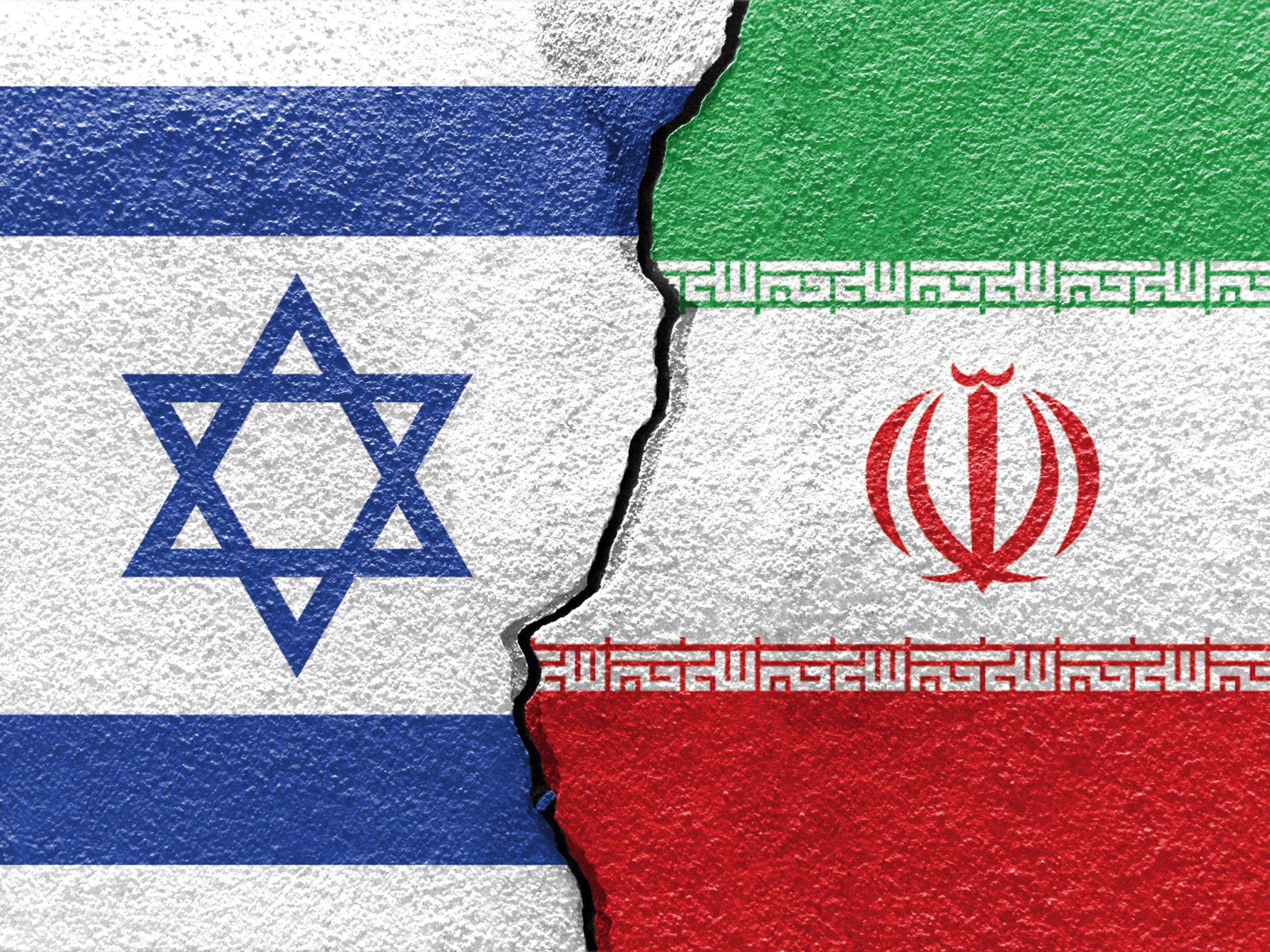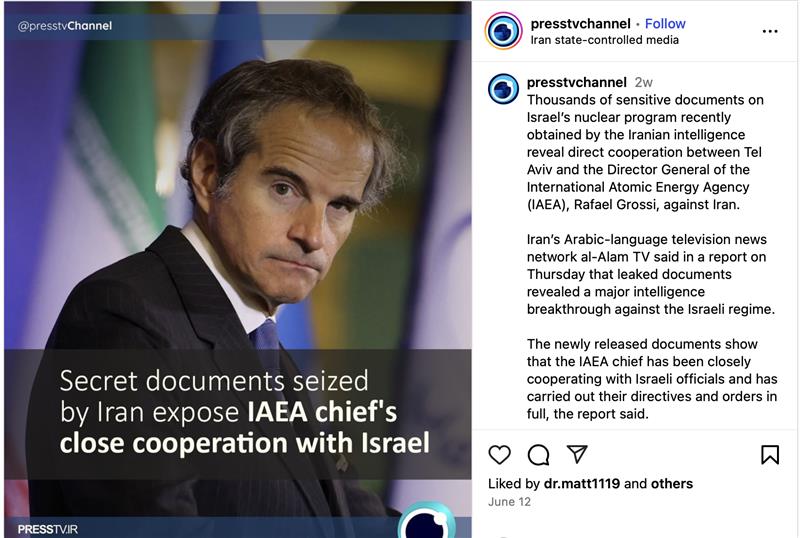Dubbing it “Operation Rising Lion”, Israel has launched widespread airstrikes across Iran, hitting key nuclear facilities and killing several military commanders and intensifying decades of hostilities between Tehran and Tel Aviv. Given Iran’s long-standing geopolitical relationship with both Russia and the People’s Republic of China (PRC), ASD researchers analyzed Iranian, Russian, and PRC state messaging about the developing conflict to assess how closely the three countries are rhetorically aligned and what it could mean for their future cooperation.
Iran
This conflict has unsurprisingly dominated Iranian state messaging, which seized on the events to lambaste Israel and sound the alarms for retaliation. Iran’s supreme leader, Ali Khamenei, took to his many X accounts in multiple languages to call Israel’s strikes against Tehran’s military and nuclear sites “satanic” and to threaten Tel Aviv. Khamenei vowed that Israel’s initial attack will not go “unavenged” and warned of “severe punishment”, even posting what appears to be an image generated by artificial intelligence of Tehran launching anti-ballistic missiles. After US President Donald Trump demanded Iran’s “unconditional surrender”, Khamenei warned on state television that US military intervention will “undoubtedly result in irreparable damage to [the United States]”. Khamenei’s sentiment for revenge was echoed across Iranian state media. Journalists on Press TV insisted that the Israeli regime will “pay a heavy price” and should expect to be “wiped out”.

Iran’s threats were buttressed by content gloating about Tehran’s military prowess and retaliatory actions. Iranian state media amplified coverage of the “massive destruction” in Israel resulting from Iran’s retaliatory strikes, including promoting footage of a power plant in Haifa ablaze and boasting that Iran allegedly became the first country to take down one of Israel’s F-35 fighter jets. In the same vein, Iranian state messengers tried to portray Israel’s military as inferior, boosting multiple reports that their air defense missile system “collapsed”. This included repeating an alleged statement by the Israeli army admitting that their defense system is “weak” and “unreliable” against Iranian missiles and promoting a video of former UN weapons inspector and RT contributor Scott Ritter, in which he claims that “Israel is defenseless”.
In addition to condemning Israel, Iranian officials and state media sought to place blame on the United States. Iranian state media called the United States an “accomplice in the bloodshed”, insisted that American leaders have “shielded Israel from accountability” for years, and criticized the United States for not upholding its obligation as a permanent member of the UN Security Council to condemn Israel’s attack. Others directly called out the US president, denouncing Trump for falling for “Netanyahu’s trap” and believing “fabricated claims” rather than US intelligence assessments that Iran was not pursuing nuclear weapons.
Official Iranian state messengers took their incrimination of the United States further, promoting various allegations that the United States, despite public refutations, is currently involved in the conflict and is aiding Israel. Iran’s Ministry of Foreign Affairs (MFA) claimed that it is “impossible Israel carried out aggression without US permission” and cited purported “evidence” that American forces are assisting Israel, including by helping to intercept missiles. Fars International even suggested that the United States and Israel were “only pretending to have differences” and that Trump gave Israel the “green light”. Adding to these allegations, several Iranian state news outlets also reported that thousands of leaked documented obtained by Iranian intelligence purportedly reveal evidence that the Director-General of the International Atomic Energy Agency (IAEA) Rafael Mariano Grossi coordinated with Israel to carry out its directives in full.
Russia
Russian officials and diplomats unanimously expressed support for Iran and blamed Western leaders for fueling anti-Iranian sentiments. At the onset of the conflict, Russia’s MFA condemned Israeli attacks on the eve of indirect negotiations between Iran and the United States and expressed a firm belief that the resolution to the Iranian nuclear program “can only be achieved through peaceful, political-diplomatic means”. Russia’s permanent representative to the United Nations, Vasily Nebenzya, declared that Israel’s attack was a gross violation of international law that stemmed from methodologically escalating an “anti-Iranian hysteria” at the UN Security Council and the IAEA Board of Governors. Sputnik Iran echoed these conclusions and blamed IAEA’s Grossi for “vague and ambiguous reports” that became a pretext for “military and psychological operations against Iran”.
Russian state media emphasized the Kremlin’s efforts to mediate the conflict and accused the United States of disrupting peace negotiations and aiding Israel. Sputnik Iran reported on the phone call between the leaders of Russia and the United Arab Emirates, highlighting the Kremlin’s readiness to mediate and advance a dialogue between Iran and Israel. Meanwhile, Russian propagandist Vladimir Solovyov amplified statements by Iran’s MFA, which blamed the United States for making negotiations on the Iranian nuclear program “meaningless”. Solovyov concluded that Trump “had made a fool of us” first by warning Israeli President Benjamin Netanyahu against striking Iran and later by calling the attack “the best thing for the market”. Sputnik Afrique added that during a phone conversation between the United States and Russia regarding mediations for the Israel-Iran conflict, Trump suggested to Russian President Vladimir Putin that they “deal with it later”. Adding fuel to the fire, former RT journalist Fiorella Isabel claimed that the United States was already involved in the conflict and was aiding Israel, posting a screenshot of flight radars that supposedly showed evidence that the United States was refueling Israeli military jets. Users added a community note to the tweet on X that highlighted that this screenshot does not in fact show aircrafts with refueling equipment.
Russian propagandists also exploited the crisis to engage in a familiar information-warfare tactic: dismaying the world with nuclear threats. The Russian MFA emphasized that the Israeli attacks on “civil nuclear sites” in Iran pushed the world toward a “nuclear disaster” and found support only among Israel’s accomplices. On the RT show Going Underground, Columbia University professor Jeffrey Sachs reminded viewers that “Netanyahu had engaged the United States in six disastrous wars” and warned that if the United States goes to war with Iran “we make nuclear war all the more likely” and it “would be [World War III]”.
China
PRC messaging around Israel’s strikes on Iran leaned clearly in Tehran’s favor. The PRC MFA denounced “actions that violate Iran’s sovereignty, security and territorial integrity”, with its statement generating over two million views on TikTok. In official communications with Iran and Israel, the MFA consistently emphasized Israeli wrongdoing. State media outlets such as CGTN America portrayed Iran’s response as a legitimate retaliation, contrasting Iran’s “retaliatory strikes” with Israel’s “unprovoked attack”.
Beijing’s messaging also sought to frame the strikes to cast a negative light on the United States. The MFA implicitly criticized Washington by urging “countries with special influence on Israel” to deescalate the crisis. State media outlets were even more pointed in their attacks against the United States, with CGTN relaying Iranian claims of evidence of US involvement in the strikes. They also relayed claims, sourced to Iranian officials, that US-made fighter jets used by Israel had been downed over Iran, though only a handful of the PRC’s more aggressive diplomats amplified these messages.
By contrast, PRC diplomats and state media outlets portrayed their country’s leadership as an appeasing force, with the MFA offering Beijing’s help to “de-escalate” the situation. In addition, as of June 19, there were burgeoning efforts from Russia and the PRC to work together to address the situation in Iran. In particular, the PRC MFA promoted news of a phone call between PRC leader Xi Jinping and Putin. However, the “four proposals” that came out of the calls were presented as a PRC contribution rather than as a joint initiative.
While the bulk of PRC messaging focused on legal and geopolitical arguments when defending Iran and condemning Israel, some individual posts showed no such restraint. In particular, the PRC Consul General in Osaka compared Israel to Nazi Germany on X.
Conclusion
The narratives that Iranian, Russian, and PRC officials and state media have been promoting since the start of the Israel-Iran conflict highlight the complex dynamics of the relationship among the three countries. While Russia and the PRC supported Iran’s right to retaliate against Israel’s “unprovoked” attacks, they stopped short of promoting the vengeful and militant messages of the Iranian regime. In contrast, both Russia and the PRC depicted themselves as possible mediators in the conflict, emphasizing the importance of a diplomatic solution. This likely indicates their desire to abstain from supporting Iran on the battlefield.
Nevertheless, all three countries united in their opposition to Western states and international organizations, especially the United States and the IAEA, blaming them for biased reporting on the Iranian nuclear program and thwarting a possible nuclear deal. All three countries also preemptively accused the United States of military assistance to Israel, possibly anticipating potential US involvement in the conflict. However, only Russia went so far as to link this scenario to World War III, warning that an attempt to denuclearize Iran could instead lead to a global nuclear confrontation.
The views expressed in GMF publications and commentary are the views of the author alone.









